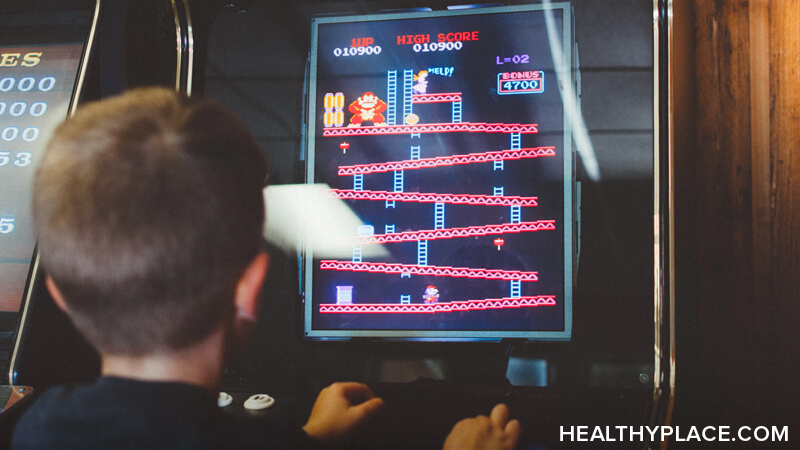How to Help Your Child Addicted to Video Games

If you’re wondering how to help your child addicted to videogames, you’re not alone. If you feel frustrated and at your wit’s end, you’re also not alone. Most parents, when they realize that their child’s gaming pastime has gradually become a gaming disorder, are at a loss for what to do. Here are some ideas on how to help your child addicted to videogames.
Helping your child (a teenager or younger) reduce gaming activities is difficult because of the nature of addiction. Quite likely, they don’t believe that gaming is a problem. Your child might also think it’s a positive part of their life; after all, part of the allure of gaming and why it’s such a powerful force is the online friendships gamers form. Gaming becomes not just playing a game but playing a game together with like-minded individuals. The fact that they aren’t real-world friends doesn’t matter.
Despite the obstacles you’re up against, you can learn how to help your child addicted to videogames. Much of the process is a matter of your mindset, perspective, and approach. Patience and understanding, too, are key—with your child and with yourself.
How to Help Your Child Addicted to Videogames: “Stop Playing” vs “Start Something”
Having goals in mind helps. A common mistake that can set parents up for a long struggle is focusing on stopping the gaming addiction. Perhaps surprisingly, that isn’t a helpful goal or purpose.
Thinking in positive terms is much more likely to lead to success. Instead of “stopping gaming,” a more effective goal is to help your child replace gaming with other activities. Taking him on a journey (it probably won’t be a short one) of discovery is important. What, other than online gaming, does he want in his life?
As your child is starting something and he gradually turns his time and attention to other things, you can let him play some videogames. Once of the ways to end an addiction is to find balance. Video gaming doesn’t have to be an all-or-nothing experience. If he knows this, he will be more likely to cooperate (eventually).
The process of replacing videogames can be slow. It also involves doing things to wean your child from gaming (How Many Hours of Video Games is Too Much?). The following dos and don’ts are tips to help your child addicted to videogames.
How to Help Your Child Addicted to Videogames: Dos:
These tips involve actions to do and perspectives to have when working with your child to end his gaming addiction. Do:
- Decide together as a parenting team (even if you’re no longer together) what the limit will be on your child’s gaming. The limit must be consistent.
- Hold firm with your limits. Your gaming rules must be enforced consistently for your child to take them seriously.
- Establish firm and consistent consequences for when they break the rules or exceed their limit (your child probably will do this, and that’s okay as long as you consistently enforce the consequences).
- Track their gaming time to help your child see how much time they’re spending gaming. Many times, kids don’t realize how much time is really passing.
- Use a signal to warn him or her when the time is almost up so they have a chance to finish what they're doing.
- Buy a timer that will automatically turn off the system (use it only if your child continues to refuse to stop).
- Keep the system unavailable when they’re not allowed to play.
- Limit screen time for the whole family. If everyone is glued to their phones, for example, it’s hard for anyone to live fully in the real world.
How to Help Your Child Addicted to Videogames: Don’ts
Avoiding actions that lead to power struggles can make the process go a bit more smoothly. When working with your child, don’t:
- Make them admit to having a problem or keep telling them they have a problem.
- Force them into wanting to change their habits. While that’s the ultimate goal, it should happen naturally over time.
- Show anger in response to any outbursts.
- Cushion their “fall” by lightening the consequences or allowing extra time.
- Enable the behavior by covering for their missed school or work, completing their homework, or otherwise taking care of their responsibilities.
Something important to remember as you help your child is that this is an addiction. Your son or daughter will likely experience video game withdrawal symptoms: restlessness, irritability, mood swings that include anger and crying, obsessive thoughts about gaming and gaming friends, and difficulty focusing on other things.
Be patient with your child and yourself. Allow the symptoms of gaming addiction to come and go, stick with your process consistently, and in time their passions and interests will replace excessive gaming. It’s how to help your child addicted to gaming.
APA Reference
Peterson, T.
(2021, December 15). How to Help Your Child Addicted to Video Games, HealthyPlace. Retrieved
on 2025, December 14 from https://www.healthyplace.com/addictions/gaming-disorder/how-to-help-your-child-addicted-to-video-games



